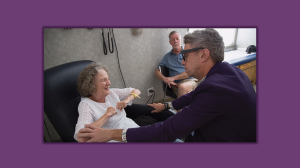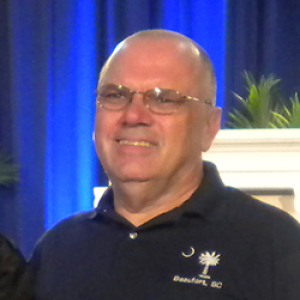$1.5 Million Gift Supports ALS Research, Carries Legacy
The lives of three men were honored recently through a $1.5 million gift to establish the Stewart, Hughes, and Wendt ALS Research Endowment. The endowment supports amyotrophic lateral sclerosis (ALS) research at Duke and acknowledges D. Loy Stewart, Larry V. Hughes, and George C. Wendt, three individuals who died of the disease.
ALS is currently incurable, and so far, no treatment that can stop or slow the progression of the disease has been found. Average life expectancy for patients after diagnosis is two to five years. Richard Bedlack, MD, PhD, director of the Duke ALS Clinic, says the endowment will help further Duke’s efforts to unlock the secrets of ALS and develop new therapies that can slow and perhaps even reverse the disease’s progress.
“Support from this endowment means a great deal to our researchers and the families impacted by this terrible disease,” Bedlack says. “It means new discoveries, better treatments, and a surge of hope for thousands of patients and families.”
George Wendt was 29 when his father was diagnosed with ALS, and he lost him to the disease before turning 30. He says both his father and Loy Stewart, a friend and mentor, had great hope for the research endowment.
“When Loy and I would have serious talks about his gift towards ALS research, it was always very clear to me that he viewed this as the last group of people he would be able to help,” George Wendt says. “He knew that the research he funded likely wouldn’t save his life but hoped it might spare the next generation. It was important for Loy that this gift would provide hope to those who have none and serve as a light in the dark.”
Along with colleagues on the ALS Clinic team, Bedlack is working to find new therapies through cutting-edge research and collaboration with experts from around the world. Among their most innovative and promising avenues of investigation is the phenomenon of “ALS reversals,” documented instances where the symptoms of ALS unexpectedly diminish and motor function returns. It is not known why these reversals occur.
Bedlack has identified more than 50 such patients whose ALS progressed to a certain point and then retreated. Over time, these patients regained motor control and ultimately recovered completely. Bedlack believes that if researchers can learn what causes ALS reversals in some patients, they may be able to replicate that process in other patients.
“Philanthropic support from sources such as this endowment allows me to pursue research that is very exciting but is also very controversial,” he says. “Traditional granting agencies probably would not fund my ALS reversals research, since the very idea that people can recover from this disease is still not widely accepted.”
The endowment has the potential to have an even greater impact. With additional donor support, the fund could grow to the amount required to establish the Stewart, Hughes, and Wendt ALS Professorship. The holder of the professorship will be a scholar in the field of neurology, specializing in ALS.
The permanent funding from the professorship will equip its holder with resources to make significant progress against ALS. Bedlack says the professorship will provide the priceless resource of time, which many ALS patients do not have.
“Winning the battle against ALS will require full-time effort,” he says. “An endowed professorship can provide the secure, sustained support that will give a dedicated scientist the freedom to concentrate fully on ALS research. It will ensure that ALS remains a top priority at Duke until it is cured.”
George Wendt says although an endowed professorship could not save his father, he finds comfort in what it will mean for others.
“We want to give families going through what we went through a fighting chance, a hope, a prayer.” He adds, “This professorship will provide a world-renowned researcher the resources and freedom to do what he thinks is necessary to find a cure for this disease. ALS is not incurable; we just haven't found it yet, and we are honored to partner with Duke in attempting to prove exactly that.”
For more information, visit the Duke ALS Clinic. To learn how you can make an impact and support ALS research at Duke, please contact Director of Development Whitney Martin at whitney.w.martin@duke.edu or 919-451-3758.





